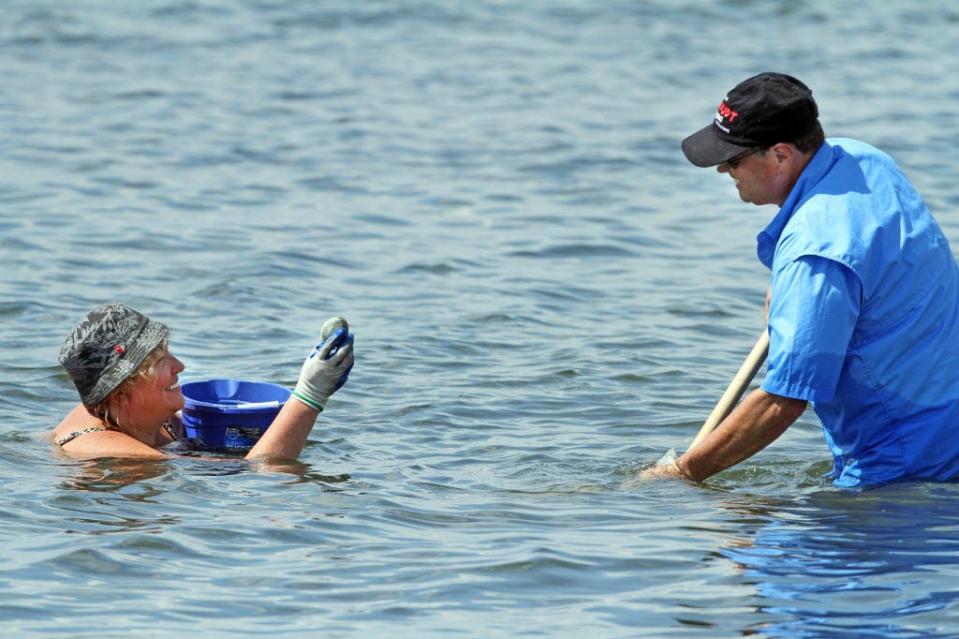Closed for swimming due to high bacteria, but open for shellfishing: What's up with that?
Dave Bonney was perplexed last week when he learned the state would let him dig shellfish near Barrington Town Beach, but also recommended against swimming at the beach, saying it was unhealthy due to high bacteria counts.
Bonney lived in Rhode Island for 32 years but now lives in Swansea. He has an out-of-state Rhode Island recreational shellfishing license and said he was planning to go clamming "just to the southeast of Barrington Town Beach," part of the state's Conditional Area A.
"How can an area be open to clamming but closed to swimming?" Bonney wondered.
Bonney raised his question with the state Department of Environmental Management, which monitors water quality at the state's shellfishing beds and determines when they should be closed. Bonney received a detailed explanation, but he was still skeptical and decided to leave shellfish off his menu, at least temporarily.

Back in business: RI Health Department recommends reopening beaches in Warwick, Barrington, Kingston, Coventry
"Yours is an interesting question that we get a few times each summer as beach closures are announced," David Borkman, principal environmental scientist for the DEM's shellfish water quality program, wrote.
The bottom line: The state tests for different types of bacteria in determining whether an area should be closed to swimming or shellfishing, according to Borkman.
"The bacterial standards used for monitoring of shellfish waters and swimming beaches target two different groups of bacteria," Borkman wrote.
Both standards are based on "epidemiological studies that have undergone extensive peer review," according to Borkman.
Two different state departments are tasked with monitoring water quality for swimming and harvesting shellfish: the DEM and the state Department of Health.
Exploring the issue: What's causing so many seabirds to turn up dead on RI beaches?
The state DEM tracks water quality in shellfishing areas, monitoring "for a very specific group of bacteria (fecal coliform) that is indicative of exposure to warm-blooded animal waste (such as sewage, pet waste, wild animal waste)," Borkman explained.
The state Department of Health monitors swimming beaches and tests for "a broader group of bacteria (Enterococci) whose presence has been associated with increased risk of illness after swimming," Borkman wrote.
The state Department of Health recommended the closing of Barrington Town Beach on Tuesday after finding high levels of enterococci bacteria. (The Health Department recommended reopening the beach to swimming on Thursday afternoon, after the bacteria count returned to safe levels.)
At the State House: Shoreline access bill unanimously passes RI House; awaits Senate action
In his response to Bonney, Borkman noted that water tests in Upper Narragansett Bay, in the Barrington Beach area on June 16 and June 23 showed fecal coliform bacteria "well below" the standard for shutting down the area for shellfishing.
The "vast majority" of bacteria in Narragansett Bay "are benign, and in fact are a food source to many organisms including filter-feeding shellfish," according to Borkman. "However, a small subset of pathogenic (to humans) bacteria may be present in marine waters."
Rhode Island and all other shellfish-producing states follow the U.S. Food and Drug Administration's National Shellfish Sanitation Program, which requires testing for "various bacterial indicators that are well-correlated with human illnesses after eating shellfish," Borkman wrote.
"Enterococci are typically not considered harmful to humans, but their presence in the environment may indicate that other disease-causing agents such as viruses, bacteria and protozoa may also be present," Borkman said. "If humans are exposed these pathogens by swimming, there is an increased risk of human illness."
Bonney wasn't sold.
"If I am swimming (and) I ingest water – the DOH standard says I might get sick from the Enterococci or other things associated with them," Bonney wrote. "I ingest the water through my mouth or nose – I get sick. Clams are in the same water. .... Are we saying the clams do not ingest these same bacteria...?"
Bonney decided he wouldn't go clamming as long as the no-swimming advisory was in place. He said he planned to celebrate the Fourth of July "sans clams."
That changed when the Health Department lifted its advisory Thursday afternoon. On Friday morning, Bonney said he planned to cut out of work early Friday, so he could catch low tide in time to dig some quahogs.
jperry@providencejournal.com
(401) 277-7614
On Twitter: @jgregoryperry
Be the first to know.
Sign up for our breaking news alerts
This article originally appeared on The Providence Journal: Why a RI beach is unhealthy for swimming but OK for shellfishing

